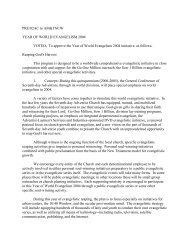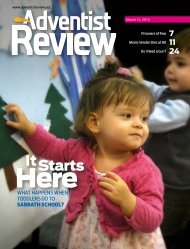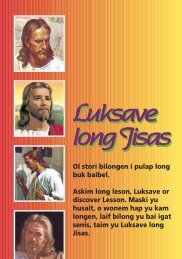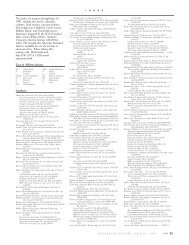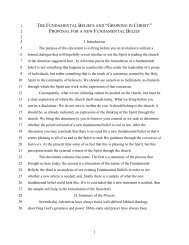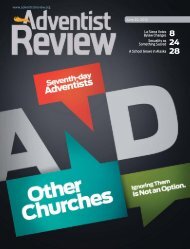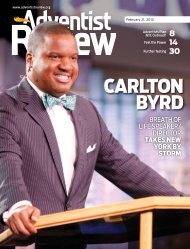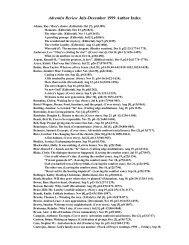Download PDF - Adventist Review
Download PDF - Adventist Review
Download PDF - Adventist Review
- No tags were found...
Create successful ePaper yourself
Turn your PDF publications into a flip-book with our unique Google optimized e-Paper software.
Cover Story<br />
Habits<br />
of<br />
the<br />
Heart<br />
Three<br />
stages<br />
of a<br />
joyful<br />
journey<br />
BY BILL KNOTT<br />
“ I<br />
have a continual longing for Christ<br />
to be formed within, the hope of<br />
glory. I long to be beautified every<br />
day with the meekness and gentleness<br />
of Christ, growing in grace<br />
and in the knowledge of Jesus Christ up<br />
to the full stature of men and women in<br />
Christ Jesus.” 1<br />
Solitude<br />
It is perhaps the least practiced spiritual<br />
habit of our harried age. Yet solitude<br />
is preeminently the habit on which all our<br />
progress as spiritual persons depends.<br />
“Be still, and know that I am God” (Ps.<br />
46:10), 2 the Lord says to His people<br />
whenever they are anxious and fearful.<br />
But we live and move as though we think<br />
that just the inverse of His Word is<br />
true—that we can know Him just as well<br />
amid the roar and din we still somehow<br />
prefer. “Speak to me instead through the<br />
earthquake, wind, and fire,” we protest<br />
to the God who prefers the “sound of a<br />
gentle whisper” (1 Kings 19:12, NLT). 3<br />
So it is that we shy away from time<br />
alone the way a 10-year-old devises<br />
ways to avoid piano practice. We invent<br />
urgent duties—homework, even; we<br />
recall other obligations; we volunteer<br />
for otherwise unwelcome tasks, fearing<br />
any environment in which we make the<br />
only sounds.<br />
The prospect of spending half a day<br />
alone terrifies well more than half the<br />
world’s population, for we have<br />
absorbed the normative noise of our<br />
overstimulated world. Without the<br />
ambient sounds of our humming<br />
devices and chattering companions, we<br />
grow suspicious that something fundamental<br />
is wrong, perhaps even dangerous.<br />
A dozen Hollywood movies have<br />
made us wary of anything “too quiet,”<br />
for in just such moments, the dreaded<br />
something lurks.<br />
If we hear no human voices; if we hear<br />
no digitized music; if we see no flickering<br />
images upon a screen, we also feel<br />
deprived, as though our senses are experiencing<br />
unhealthy starvation. And so we<br />
make of solitude an unattainable goal, an<br />
accomplishment only for saints. The habit<br />
of solitude becomes a virtue we take none<br />
too seriously because it makes us feel<br />
uncomfortable, ill at ease, or unsettled.<br />
But it wasn’t so with Jesus. The Scriptures<br />
tell us that He chose aloneness at the<br />
beginning of His public ministry: “Immediately<br />
the Spirit drove Him into the wilderness.<br />
And He was there in the<br />
wilderness forty days, tempted by Satan,<br />
and was with the wild beasts; and the<br />
angels ministered to Him” (Mark 1:12, 13).<br />
After rejoicing in His Father’s audible<br />
approval at His Jordan River baptism,<br />
Jesus chose the prolonged quietness of<br />
the wilderness in which only His Father<br />
spoke to Him. Before He turned water<br />
into wine at Cana, Jesus knew in the<br />
desert that quiet could be turned into<br />
strength. Before He gave a deaf-mute<br />
man the power to speak again, Jesus<br />
chose for Himself a fast from everyday<br />
20 (836) | www.<strong>Adventist</strong><strong>Review</strong>.org | September 19, 2013




